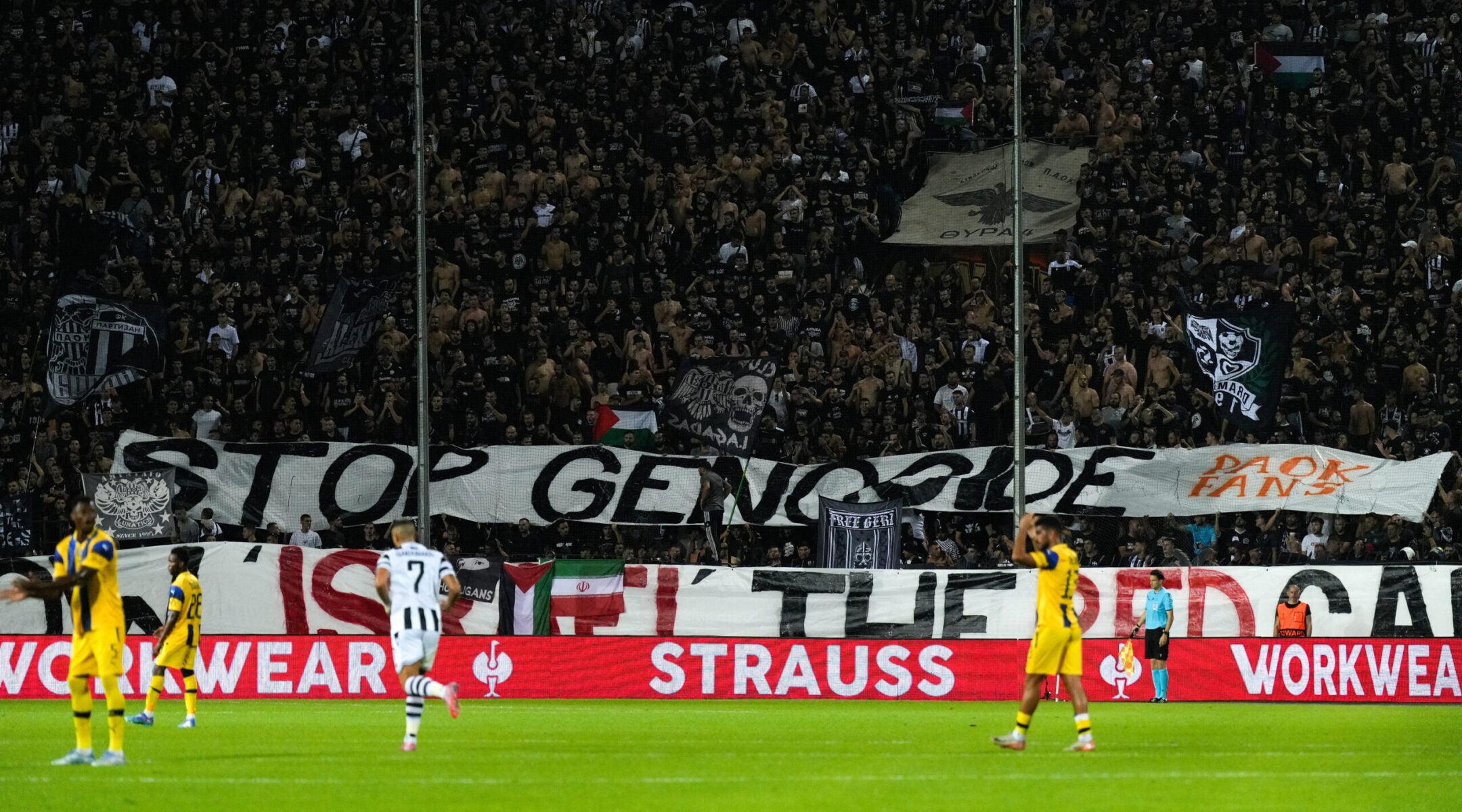An attack on Israeli soccer fans last year was dubbed a ‘pogrom.’ Could it happen again?
Maccabi Tel Aviv fans were barred from attending an upcoming soccer game over safety concerns

Fans raise a banner that reads “Stop Genocide — Show Israel the Red Card” during a September football match between PAOK and Maccabi Tel Aviv in Greece. Photo by Konstantinos Tsakalidis/Anadolu via Getty Images
When fans of the soccer team Maccabi Tel Aviv were assaulted in the streets of Amsterdam after a game last November, the violence drew comparisons to pogroms. It even prompted Israeli Prime Minister Benjamin Netanyahu to dispatch rescue planes to evacuate Israeli citizens.
Now, once again there are fears of a repeat outbreak of violence, this time over a match in Birmingham, England.
Local police reportedly requested supporters of Maccabi Tel Aviv be kept away from the match against the English team Aston Villa, classifying the sporting event as a “high risk” threat to public safety. On Thursday, authorities told Israeli fans they would be banned from attending.
But after that move sparked accusations of antisemitism, the British government said it is doing “everything in its power” to reverse the decision and let Israeli fans buy tickets.
“This is the wrong decision. We will not tolerate antisemitism on our streets,” Prime Minister Keir Starmer posted to X. “The role of the police is to ensure all football fans can enjoy the game, without fear of violence or intimidation.”
What happened at the game in Amsterdam?
The day before a November 2024 game against the Dutch team AFC Ajax, Maccabi Tel Aviv fans vandalized a taxi and burned a Palestinian flag, police said.
After the game, groups of men on scooters roamed the streets looking for Israeli fans, beating and kicking them and throwing fireworks, police said. At least five Israelis were hospitalized, and more than 60 people were arrested. Authorities uncovered WhatsApp and Telegram messages prior to the attacks urging a “Jew hunt.”
Amsterdam Mayor Femke Halsema called the attacks “antisemitic hit-and-run squads.” Others drew Holocaust comparisons, with Netanyahu noting the assaults took place near the anniversary of Kristallnacht.
“We failed the Jewish community of the Netherlands during World War II, and last night we failed again,” King Willem-Alexander of the Netherlands said the morning after the attacks.
Days later, protesters set fire to a tram car in Amsterdam while shouting “Free Palestine” and “Kanker Joden,” or “cancer Jews.”
Israel’s growing isolation
Fallout over Gaza in the world of international sports suggests just how perilous Israel’s international standing has become.
Earlier this week, the Court of Arbitration for Sport confirmed that Israel would be barred from competing at the gymnastics world championship in Indonesia this weekend. The court said it had no control over Indonesia’s decision to deny Israeli athletes visas, which was made amid outcry over Israel’s military offensive in Gaza.
At a September cycling race in Spain, the presence of an Israeli team drew thousands of protesters, forcing the race to end 31 miles short of the finish line.
Meanwhile, the International Federation of Muaythai Associations in August banned the display of the Israeli flag and the playing of Israel’s national anthem at all its martial arts competitions.
In the United Kingdom, some argued that banning Maccabi Tel Aviv fans wasn’t enough, calling for the team itself to be barred from competition.
In the leadup to the ban on supporters of the Israeli team, British MP Ayoub Khan and former Labour leader Jeremy Corbyn launched a petition to cancel the game entirely, citing both the “ongoing genocide in Gaza” and the “track record of violence by Maccabi Tel Aviv fans.” The petition, which launched in September prior to the ceasefire, drew nearly 4,000 signatures.
The tensions have also impacted major international tournaments. Last month, the European soccer federation UEFA was reportedly set to vote on banning Israel from international competition over the war in Gaza — a move that would have prevented the country from qualifying for the 2026 World Cup. The vote was paused, however, following the announcement last week of the Gaza ceasefire.
On Friday, local officials called a meeting for an “immediate review” of the decision to ban Maccabi Tel Aviv fans, with sources telling The Athletic they expect the policy to be reversed.
















